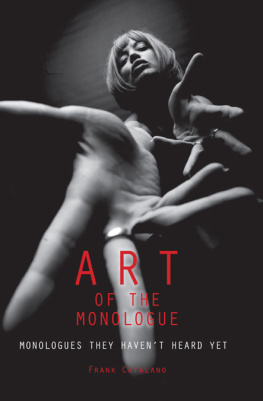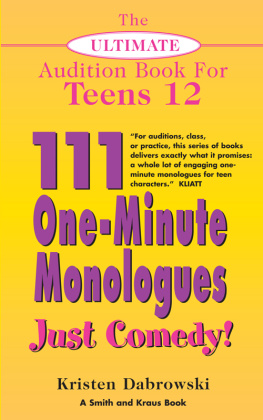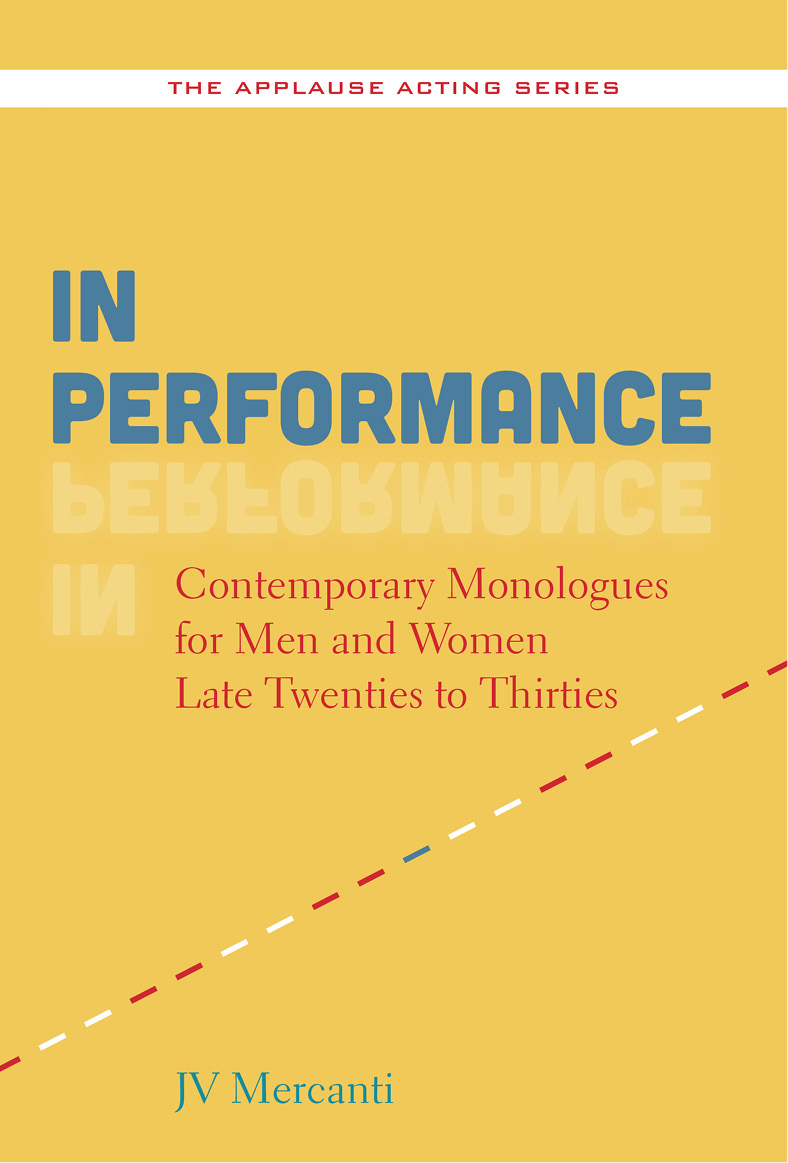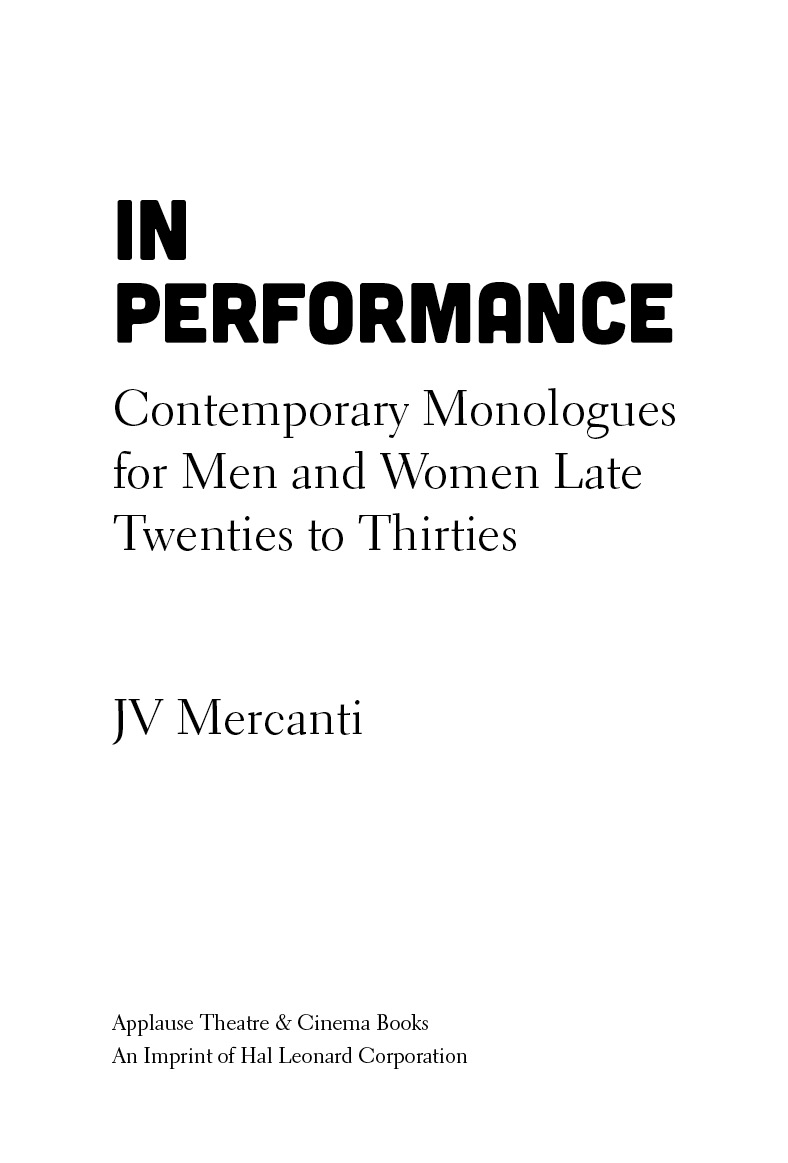Copyright 2014 by JV Mercanti
All rights reserved. No part of this book may be reproduced in any form, without written permission, except by a newspaper or magazine reviewer who wishes to quote brief passages in connection with a review.
Published in 2014 by Applause Theatre & Cinema Books
An Imprint of Hal Leonard Corporation
7777 West Bluemound Road
Milwaukee, WI 53213
Trade Book Division Editorial Offices
33 Plymouth St., Montclair, NJ 07042
Permissions can be found , which constitutes an extension of this copyright page.
Printed in the United States of America
Book design by Mark Lerner
Library of Congress Cataloging-in-Publication Data
In performance : contemporary monologues for men and women late twenties to thirties / [edited by] J V Mercanti.
pages cm
ISBN 978-1-4803-6747-0
1. Monologues. 2. Acting--Auditions. I. Mercanti, J. V., editor of compilation.
PN2080.I5225 2014
808.8245--dc23
2014025806
www.applausebooks.com
Contents
By Rob Ackerman
By Rob Ackerman
By Stephen Belber
By Stephen Belber
By Adam Bock
By Adam Bock
By Alexi Kaye Campbell
By Julia Cho
By Julia Cho
By Julia Cho
By Bathsheba Doran
By Jesse Eisenberg
By Laura Marks
By Geoffrey Nauffts
By Lynn Nottage
By Sarah Ruhl
By Nicky Silver
By Lucy Thurber
By Lucy Thurber
By Adam Bock
By Alexi Kaye Campbell
By Jack Canfora
By Julia Cho
By Julia Cho
By Julia Cho
By Lisa DAmour
By Lisa DAmour
By Lisa DAmour
By Bathsheba Doran
By Jesse Eisenberg
By Kirsten Greenidge
By Donald Margulies
By Geoffrey Nauffts
By Lynn Nottage
By Scott C. Sickles
By Judith Thompson
By Judith Thompson
By Judith Thompson
By Lucy Thurber
By Lucy Thurber
By Jennifer Wynne Webber
By Anna Ziegler
One of the best auditions Ive ever seen was for Roundabout Theatre Companys 2001 revival of Stephen Sondheim and James Goldmans musical Follies . Jim Carnahan, the casting director, and I had called in Judith Ivey for the role of Sally Durant Plummer. If you dont know who Judith Ivey is, please Google her immediately. You have most likely seen her in something on stage, in film, or on television. You might also have seen a production that shes directed. She is a prolific artist.
The role of Sally Durant Plummer is fragile and complex. Sally has been married to Buddy for years, but all that time she has been pining for the love of Ben Stone, who is (unhappily) married to Sallys former best friend, Phyllis. Sally is going crazy with love and desire that has been burning for over twenty years.
Ms. Ivey was asked to prepare a cut from Sallys famous first-act song In Buddys Eyes, an aria through which she tries to convince Ben, in order to make him jealous, that shes deliriously happy in her life with Buddy. She was also asked to prepare a short scene from the show. Present in the room for the audition were Stephen Sondheim, the composer and lyricist; Matthew Warchus, the director; Todd Haimes, artistic director; Jim Carnahan, casting director; Paul Ford, the accompanist; a reader; and myself.
Walking into the room as herself, Ms. Ivey conversed with Mr. Warchus and Mr. Sondheim about her career and, very briefly, about the character. She then took a moment with Paul Ford to discuss the music. Following that, she came to the center of the playing space, closed her eyes, took a deep breath, and prepared herself to begin acting. In that moment of preparation, which truly lasted no longer than a breath, her body changed, her physicality changed, the very air around her seemed to change. She took the character into her body. Ms. Ivey then opened her eyes, nodded at Mr. Ford, and began to sing.
Ms. Ivey executed the song with specificity, a rich but contained emotional connection to the material, a strong objective, carefully thought-out actions, and a deep understanding of this woman and her desire. She went directly from the song to the scene, completely off-book (lines memorized), and when she finishedthe room was silent. Mr. Sondheim had tears in his eyes. Mr. Warchus didnt have a word of direction to give her. It was not that Ms. Ivey had provided us with a complete performance. No, not at all. She had shown us the possibility of what she could create. She had shown us the potential of her Sally Durant Plummer. Her point of view was clear, consistent, and deeply, deeply affecting.
Thank you, Judith. That was wonderful, Matthew Warchus finally said.
I really love Sally, she responded, But I was wondering if you might also consider me for the role of Phyllis. Ive prepared that material as well.
Of course I would. Would you like a few minutes to go outside and prepare? he asked.
No. No, thats all right. I can do it right now, she responded.
And after saying this, Ms. Ivey closed her eyes. She very slowly turned away from us, put her hair up in a tight bun, and turned around to face the room. It took no longer than thirty seconds, but once again her body, her posture, the way she related to the air around her, had changed. The atmosphere of the room shifted with her. Once again, she nodded to Paul Ford at the piano, and she fearlessly launched into the Phyllis Stone material.
It was astonishing. Not a false note was sung or uttered. Ivey had such a deep understanding of the cold facade Phyllis wears in order to cover up her broken heart and broken dreams. Phyllis is the polar opposite of Sally: cool, controlled, calculating, and hard.
Ms. Ivey thanked us for the opportunity. We thanked her for her work. The room remained still and silent for a while after she left.
Without a doubt, Mr. Warchus knew he must cast her in the show. She landed the role of Sally Durant Plummer.
It was clear that Ms. Ivey did a very thorough study of the text in preparation for this audition. She understood who these characters were at their very core; how they thought; why they spoke the way they did, using language in their own individual and specific way. She understood how they moved, where they held their weight, how they related to the space around them. Most importantly, she understood the characters objectives (what they wanted) and how to use the other person in the scene to get what she wanted. Finally, Ivey was excited to show us how she could portray these women. She wasnt concerned about getting it right. She managed to accomplish this while bringing herself to the character instead of the other way around.
More recently, I was casting the Broadway revival of Romeo and Juliet starring Orlando Bloom and Condola Rashd. The process of making this production happen is a book in and of itself. It was in development for over three years.
I flew to Los Angeles to work with Mr. Bloom in June 2012. We spent a week going through the text, talking about objectives, tactics, and actions. We defined Romeos main objective, simply, as to fly towards the sun. Then we discussed his relationship with the other characters in the play and how they connected to this objective.
Wait. Why isnt his objective about Juliet, you ask? His super-objective cannot be about Juliet, because, upon Romeos first entrance in the play, he hasnt even seen her yet. He cant come on stage playing to win someone he doesnt even know. But if you perform a careful analysis of the text, you will find a plethora of both sun and flying imagery. Once he finds Juliet, she becomes his sun. This is why its helpful as an actor to jot down the recurring themes or images you come across when reading a play youre working on, even if youre only focusing on a monologue from a larger text. This is also why its important to pay attention to the words the playwright uses.









